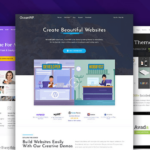Are you looking for the best blogging platforms? You are in the right place!
Blogging has become a popular hobby and career option for many around the world today. It’s amazing to see that blogging, which started out as a way to communicate personal thoughts and experiences online, has now become a full-fledged industry.
There are many reasons why people love blogging today. For starters, it’s a great way to express yourself and your thoughts without having to worry about being judged for them. You can also share your knowledge and expertise with the world, and help others learn from your experiences.
Additionally, blogging can be a great way to build an online presence and connect with like-minded people from all over the globe. It can also be a fantastic way to make some extra money on the side.
If you’re thinking of starting a blog, or if you’re simply looking for a new platform to blog on, then you’ve come to the right place. In this article, we’ll be taking a look at seven of the best blogging platforms at the moment.
Table of Contents
Choosing The Best Blogging Platform – What to Look for?
When it comes to choosing the best blogging platform, it’s important to consider several key factors. These include:
- Customization options: The level of customization offered by the platform can have a significant impact on the look and feel of your blog. Consider whether the platform offers customizable templates, themes, and widgets that allow you to create a unique and professional-looking blog.
- User-friendliness: The platform should be easy to use, even if you’re a beginner. Consider the user interface, tools, and features available, and whether the platform offers tutorials or support resources.
- SEO capabilities: Search engine optimization (SEO) is crucial for getting your blog noticed by search engines and your target audience. Consider whether the platform offers built-in SEO features, such as meta tags, custom URLs, and the ability to add alt tags to images.
- Speed and reliability: A fast and reliable platform is essential for keeping your audience engaged and reducing bounce rates. Consider the platform’s speed and reliability, as well as its uptime history.
- Mobile compatibility: With the increasing use of mobile devices, it’s essential that your blog is mobile-friendly. Consider whether the platform offers responsive design templates that adjust to different screen sizes and whether it provides mobile optimization features.
- Monetization options: If you plan to monetize your blog, consider whether the platform offers options for advertising, sponsorships, or selling products.
- Cost: The cost of the platform can vary greatly, so it’s important to consider your budget. Consider whether the platform offers a free version and whether the premium version is worth the cost based on the features it offers.
By considering these factors, you’ll be able to choose the best blogging platform that meets your needs and helps you achieve your goals. Remember, a successful blog is not just about the platform you choose, but also about the quality of your content and your commitment to your audience.

What is the best blogging platform?
Here are our top 7 picks for the best blogging platforms at the moment:
1. WordPress
WordPress is the world’s most popular blogging platform and for good reason. It’s free, open-source, and incredibly flexible. With WordPress, you can create any type of blog, from a simple personal blog to a complex e-commerce website. WordPress offers thousands of plugins and themes, allowing you to customize your site’s design, functionality, and SEO.
One of the biggest advantages of using WordPress is its scalability. As your blog grows, you can add new features, functionalities, and capabilities to your site, without having to switch to a different platform. This makes WordPress ideal for bloggers who want to grow their blog into a money-making website.
If you want to start a WordPress blog, then you should consider using Bluehost as your hosting provider. This will cost you only $2.95 per month (using our special link below).
2. Wix
Wix is a drag-and-drop website builder, which also offers a blogging platform. It’s a great choice for those who want an easy-to-use platform that requires no coding or design skills. Wix offers hundreds of templates and themes, making it easy to create a unique and professional-looking blog.
Wix’s drag-and-drop interface makes it easy to customize your site, without having to write any code. However, this ease of use also means that there are limitations to what you can do with your site. For example, you can’t add custom code or plugins to your site, and you’re limited to the templates and themes offered by Wix.
3. Medium
Medium is a popular blogging platform that emphasizes on community and collaboration. It is ideal for bloggers who want to share their thoughts and ideas with a wider audience, as well as for businesses who want to reach out to their customers with high-quality content. Medium offers a clean and user-friendly interface, making it easy to create and publish content.
One of the main advantages of Medium is its simplicity. The platform provides a basic layout that makes it easy to focus on writing, without having to worry about design and layout. This simplicity also means that users can quickly and easily create posts, without having to spend a lot of time learning how to use the platform.
Another advantage of Medium is its reach. Medium has a large and growing user base, and its posts are frequently shared and recommended by others. This means that your posts are more likely to be seen by a wider audience and that you can build up a following more easily than on other blogging platforms.
Finally, Medium is a great platform for businesses who want to create and share content with their customers. The platform allows businesses to create a brand page, where they can share updates and news, as well as post articles and blog posts. This makes it easy for businesses to connect with their customers and build a relationship with them through high-quality content.
4. Ghost
Ghost is a minimalist and fast-loading platform, designed specifically for bloggers. It’s a great choice for those who want a clean, simple, and elegant blog, with a focus on writing.
Ghost offers a range of customization options, allowing you to customize the look and feel of your blog. However, the customization options are more limited compared to WordPress. For example, you can’t add plugins or custom code to your site. Ghost is ideal for bloggers who want a simple and elegant platform, without the hassle of complex customization options.
5. Blogger
Blogger is a simple and easy-to-use platform, owned by Google. It’s a great choice for those who are just starting out with blogging, as it’s free and requires no technical knowledge. However, it’s limited in terms of customization options, compared to WordPress.
Blogger offers a range of templates and themes, allowing you to customize the look and feel of your blog. However, the customization options are limited compared to WordPress, and you can’t add plugins or custom code to your site. This makes Blogger a good choice for beginners who want a simple and easy-to-use platform, but not for bloggers who want full control over the design and functionality of their site.
6. Weebly
Weebly is a user-friendly blogging platform that offers a variety of features for both personal and professional bloggers.
It offers a drag-and-drop website builder, making it easy for users to create a customized and professional-looking website. Weebly also offers a range of templates and design options, allowing users to create a website that truly reflects their brand and style.
7. Tumblr
Tumblr is a popular blogging platform that is ideal for users who want to share their thoughts and ideas in a visual format. It is a micro-blogging platform that allows users to share short updates, images, videos, and other types of content.
Tumblr is known for its clean and user-friendly interface, making it easy for users to quickly and easily create and share content.
Best Blogging Platforms FAQs.
Which blogging platform is best for beginners?
For beginners, we recommend starting with WordPress. This platform offers user-friendly interfaces, a wide range of customizable templates, and many features to help you build a professional-looking blog with ease.
Additionally, WordPress has large communities of users, so finding support and resources is easy. Ultimately, the best platform for a beginner will depend on your individual needs and goals, but WordPress is a great place to start.
How do I pick a blogging platform?
There are many factors to consider when picking a blogging platform. Some of these factors include ease of use, flexibility, and support.
Other important factors to consider include your budget and your blogging goals. Ultimately, the best platform for you will depend on your specific needs and preferences.
Do I need to pay for a blogging platform?
No, you don’t need to pay for a blogging platform in order to start a blog. Many platforms, including WordPress, Blogger, and Medium, are free to use for personal blogs.
However, there are some premium features that you may need to pay for if you want to use them. For example, most platforms offer paid themes and plugins that you can use to customize your blog’s design and functionality.
Which is the most popular blogging platform?
The most popular blogging platform is WordPress, with over 60% of all websites using it. This is largely due to its popularity among bloggers, as well as the huge community of support and resources that are behind it. However, other popular platforms include Blogger, Tumblr, Wix, Joomla, and Weebly.
Do I need to know how to code to use a blogging platform?
No, you don’t need to know how to code in order to use a blogging platform. However, knowing how to code can be helpful if you want to customize your blog’s design or functionality.
Many platforms, including WordPress and Joomla, offer basic coding tutorials or support if you need it. Additionally, there are many online resources that you can use to learn more about coding and best practices.
Conclusion.
Choosing the best blogging platform is a crucial decision that will affect the success of your blog. By carefully considering the key factors and selecting the platform that best meets your needs, you’ll be on your way to creating a successful and engaging blog that resonates with your audience.
While each platform has its own unique features and benefits, some platforms may stand out as the best option for beginners. For example, WordPress offers a high degree of customization and SEO optimization, while Wix is known for its user-friendly interface and mobile compatibility.
Ultimately, the best blogging platform for you will depend on your individual needs, goals, and experience. Whether you’re a beginner or a seasoned blogger, it’s important to choose a platform that allows you to express yourself and reach your audience effectively. So take your time, do your research, and choose the platform that is the best fit for you and your blog.
Happy blogging!







